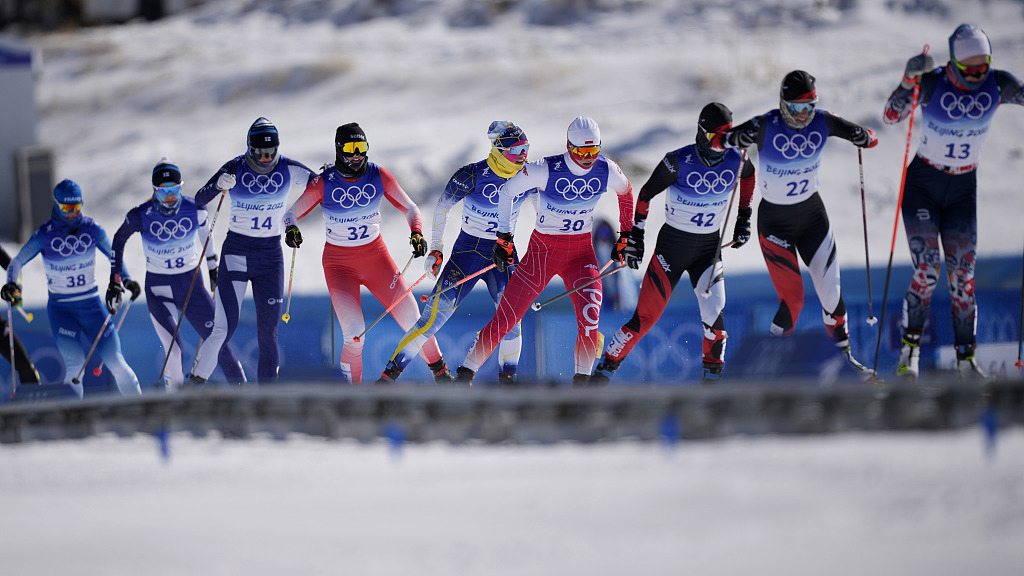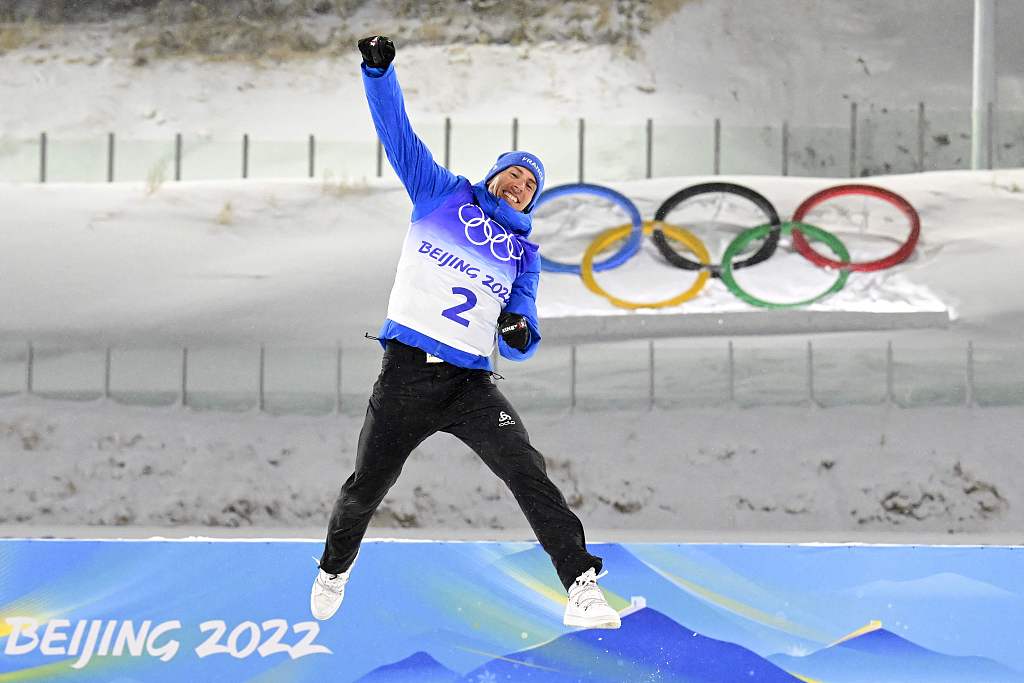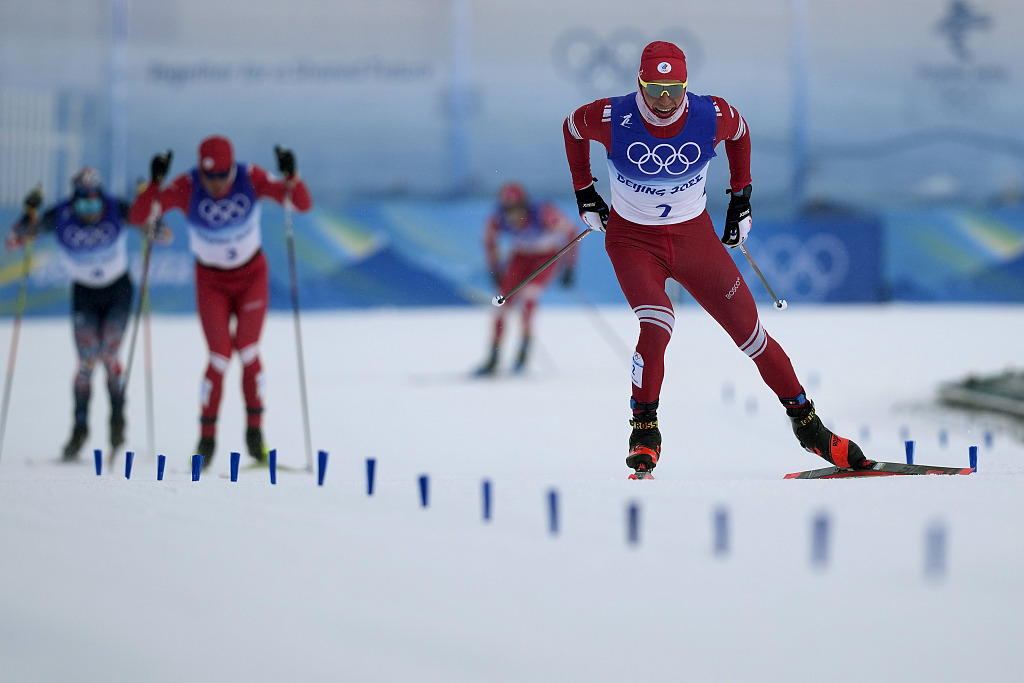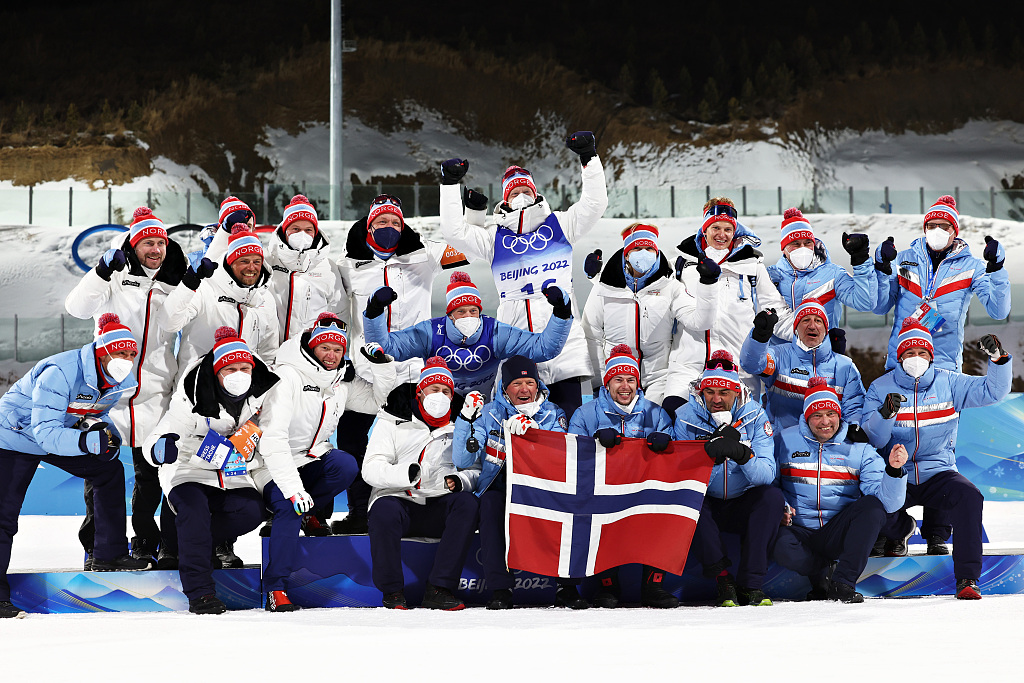
Skiers compete during the women's cross-country skiing 30km mass start free competition at the Beijing 2022 Winter Olympics in Zhangjiakou, China, February 20, 2022. /CFP
Skiers compete during the women's cross-country skiing 30km mass start free competition at the Beijing 2022 Winter Olympics in Zhangjiakou, China, February 20, 2022. /CFP
Nordic events turned into a Norwegian fest at the Beijing 2022 Winter Olympics as the Scandinavian nation swept medals in the biathlon and cross-country, and big names dominated the races.
From Therese Johaug and Alexander Bolshunov to Quentin Fillon-Maillet and Marte Olsbu Roeiseland, a handful of athletes kept climbing onto the podium again and again at these Winter Games.
Read more: Olympic review: Snowboard, freeski keep soaring at Beijing 2022 Games
In all, 31 events were held across four Nordic sports – biathlon, cross-country, ski jumping and Nordic combined – in Zhangjiakou, north China, during the two weeks.
And with a population of just 5.5 million, Norway once again proved its excellence in this field.
Record medals
Of the 37 medals it won at the Beijing Olympics – again topping the medals table, as it did at PyeongChang in 2018 – 27 were in Nordic events, and 14 in the biathlon alone.
Team Norway's Roeiseland nabbed two gold in the women's biathlon 7.5km sprint and 10km pursuit and two bronze in the 12.5k mass start and 15km individual, becoming the first female biathlete to win a medal in four individual races at one Winter Olympics.

Marte Olsbu Roeiseland of Team Norway shoots during the women's biathlon 10km pursuit at the Beijing 2022 Winter Olympics in Zhangjiakou, China, February 13, 2022. /CFP
Marte Olsbu Roeiseland of Team Norway shoots during the women's biathlon 10km pursuit at the Beijing 2022 Winter Olympics in Zhangjiakou, China, February 13, 2022. /CFP
Her compatriot Johannes Thingnes Boe took two individual gold in sprint and mass start and bronze in the 20km individual to add to his bulging trophy cabinet, while France's new star Fillon-Maillet made off with two individual gold in the pursuit and 20km and silver in the sprint.
Adding their top performances in team events – Norway won both the mixed relay and men's relay ahead of France – this left the trio with five medals each, a feat no biathlete had ever achieved at a single Winter Games until now.
Going out on a high
It was a similar story in cross-country, but with the Russian Olympic Committee (ROC) replacing France as Norway's biggest challenger.
One of the most memorable stories of the Games will be Norwegian Johaug, a 14-time world champion, returning to the Olympics after she missed them in 2018 due to a doping suspension and winning her first individual gold. She then tripled that tally by winning the 10km classic and 30km mass start on top of the skiathlon, crowning what she already said would be her last Winter Games.

France's Quentin Fillon Maillet celebrates on the podium after winning the gold medal in the men's biathlon 12.5km pursuit during the Beijing 2022 Winter Olympic Games at the National Biathlon Center in Zhangjiakou, China, February 13. /CFP
France's Quentin Fillon Maillet celebrates on the podium after winning the gold medal in the men's biathlon 12.5km pursuit during the Beijing 2022 Winter Olympic Games at the National Biathlon Center in Zhangjiakou, China, February 13. /CFP
The ROC's Bolshunov, winner of the World Cup crystal globe for two years running, also came out fighting. After only managing second and third places in PyeongChang, he made it onto the podium in all five races in which he started in Zhangjiakou, bagging individual gold in the skiathlon and mass start, and a team gold in the men's 4x10km relay.
His main rival, Johannes Hoesflot Klaebo of Norway, defended his Olympic sprint title from 2018 and added team sprint gold and men's relay silver with the Norwegian team. But it was a mark of the 25-year-old's dominance in recent seasons that this medal haul still felt somewhat disappointing, as he finished 40th in the skiathlon and abandoned the mass start early due to a stomach bug.
Between them, Norway and the ROC swiped more than half the medals on offer in cross-country.
One notable exception was Jessie Diggins of Team USA, who won her country's first Olympic gold medal in the sport four years ago with Kikkan Randall. This time, the World Cup leader took home two individual medals, bronze in the sprint and silver in the mass start.
Difficult conditions
Already one of the most energy-intensive sports at the Winter Olympics, with top athletes consuming up to 7,000 calories per day to perform, the cross-country skiing events faced additional challenges at the Beijing Games amid freezing temperatures around -20 degrees Celsius and blistering winds.

Alexander Bolshunov of the ROC nears the finish during the men's weather-shortened cross-country skiing 50km mass start free competition at the Beijing 2022 Winter Olympics in Zhangjiakou, China, February 19, 2022. /CFP
Alexander Bolshunov of the ROC nears the finish during the men's weather-shortened cross-country skiing 50km mass start free competition at the Beijing 2022 Winter Olympics in Zhangjiakou, China, February 19, 2022. /CFP
Several athletes reportedly finished their race on the brink of collapse, especially with competitions often held after sunset.
As a result, the men's mass start was shortened from 50 kilometers to 30 kilometers, while the women's race was moved up from 3 p.m. to 11 a.m. to take advantage of the sunlight.
There was plenty of drama elsewhere as the inaugural mixed team ski jumping event saw five athletes from four of the top-ranked teams disqualified over suit irregularities. A strong Slovenian team led by Olympic champion Ursa Bogataj and bronze medalist Nika Kriznar went on to claim gold, but second place for the ROC and third place for Canada will remain an oddity of these Winter Games.
Read more: Slovenia wins controversial mixed team ski jumping debut at Beijing Olympics
Ski jumping was also where Asia won its sole gold medal in Nordic events, with Ryoyu Kobayashi of Japan winning on the normal hill and taking silver on the large hill.
Japan also did well in Nordic combined with two bronze medals in the individual large hill/10km and team large hill/4x5km events. But here, too, they faced superior Norwegian and German counterparts.

Gold medalist Johannes Thingnes Boe and bronze medalist Tarjei Boe pose with members of Team Norway after the men's biathlon 10km sprint at the National Biathlon Center in Zhangjiakou, China, February 12, 2022. /CFP
Gold medalist Johannes Thingnes Boe and bronze medalist Tarjei Boe pose with members of Team Norway after the men's biathlon 10km sprint at the National Biathlon Center in Zhangjiakou, China, February 12, 2022. /CFP
COVID-19 and a wrong turn
Lest we forget that these Beijing Games were being held during a global pandemic, two of Nordic combined's biggest stars found themselves in isolation after testing positive for COVID-19 on their arrival in China and only just made it out in time to compete.
Eric Frenzel of Germany took home silver in the team event, although he was unable to defend his 2018 Olympic title on the normal hill.
More dramatically, Norway's Jarl Magnus Riiber, a reigning world champion and three-time World Cup crystal globe winner, was cleared to compete on the day of the large hill/10km event and was on course for a gold medal when he made a wrong turn and dropped to eighth place.
"Maybe it's not my Olympics," Riiber said, a reminder that anything can happen at the Olympics.
(Reporting from Zhangjiakou)

